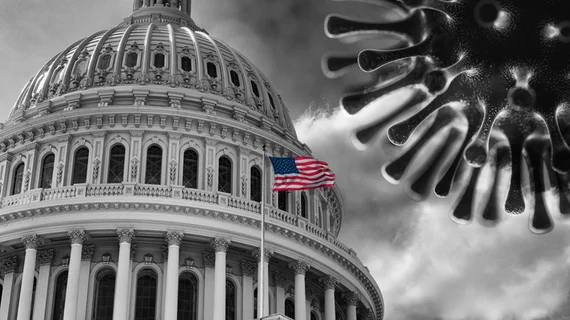Congress mitigates radiologist pay cuts, passing year-end spending bill with $3B cash infusion
UPDATED: 12/30/2020
After months of fierce fighting on Capitol Hill, Congress on Monday, Dec. 21, night approved legislation that will avert millions in Medicare pay cuts for radiologists and other physician specialists. President Donald Trump later signed the 2021 Consolidated Appropriations Act on Dec. 27, which also includes a long-discussed ban on surprise medical bills.
Physician advocates have pushed hard for these change in recent months, writing hundreds of letters to their representatives. Under the final bill, the feds will inject $3 billion into the Medicare Physician Fee Schedule, resulting in across-the-board payment increases “helping all providers during the ongoing COVID-19 pandemic,” according to a summary.
The American College of Radiology helped lead a group of nearly 80 medical societies, representing more than 1 million providers, opposing these specialist pay decreases, set to take effect Jan. 1. ACR said it will continue working with Congress and the administration to “build on these policies,” ensuring that radiologists and other docs can continue serving patients during these “turbulent times.”
“With the economic impact of COVID-19, immediate double-digit Medicare provider cuts would have devastated patient access, communities and provider practices,” Howard Fleishon, MD, chairman of the college’s board of chancellors, said in a statement. “The mitigation in this bill is a far better immediate outcome for radiologists and other providers than we would have otherwise faced Jan. 1.”
Along with the cash infusion, the bill also blocks a new code created by the MPFS for three years to further blunt payment reductions by one-third. Diagnostic radiologists were slated to see a 10% drop to help offset corresponding pay increases for primary care and others who bill for evaluation and management services. With Monday’s change, the rad reduction would fall to about 4% in 2021, with phased-in adjustments to follow, ACR noted.
Imaging groups such as the Radiology Business Management Association have said they supported much-needed reimbursement hikes for PCPs, but not if they came on the backs of other physicians.
“The house of medicine needs to continue to work together in 2021 to create a more balanced approach methodology that can reward primary care providers without penalizing specialists,” RBMA Executive Director Bob Still told Radiology Business Monday.
The legislation would also continue current Alternative Payment Model thresholds for two more years. This, lawmakers noted, would allow more providers to qualify for the 5% APM payment who might not have otherwise, due to statutory increases in threshold amounts.
“Together, these policies will greatly benefit all providers during the pandemic and mitigate at least two-thirds of the cuts to certain providers due to Medicare budget neutrality requirements,” the summary noted.
Finally, the Appropriations Act incorporates a ban on “surprise” medical bills from out-of-network radiologists and other providers, first hinted at earlier this month. ACR called the final version “vastly improved” from previous iterations. Lawmakers have now removed any minimum monetary threshold to start dispute resolutions between radiologists and payers, along with provisions using the median in-network rate as a benchmark for payment.
In addition, the bill has excluded traditionally lower Medicare, Medicaid and workers’ comp pay rates from consideration in the dispute-resolution process, which ACR had cited as a key sticking point.
“This legislation provides needed protections for patients and a broad, first step framework to address provider-payer payment disputes,” Fleishon said. “We are glad that Congress acted on the improvements we offered to make this policy better for patients and providers.”
In even more good news for the provider community, the spending package pushes back implementation of the radiation oncology bundled payment model by another six months. The effort was slated to kick off on July 1 after another recent delay but will now move to Jan. 1, 2022.

